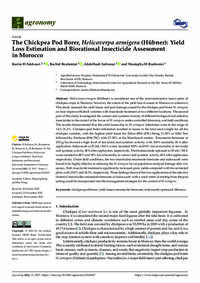The Chickpea Pod Borer, Helicoverpa armigera (Hübner): Yield Loss Estimation and Biorational Insecticide Assessment in Morocco

Authors:
Helicoverpa armigera (Hübner) is considered one of the most destructive insect pests of chickpea crops in Morocco; however, the extent of the yield loss it causes in Morocco is unknown. This study assessed the yield losses and pod damage caused by the chickpea pod borer H. armigera on four improved Kabuli varieties with insecticide treatment at two different locations. The second part of this study investigated the contact and systemic toxicity of different biological and selective insecticides in the control of the larvae of H. armigera under controlled laboratory and field conditions. The results demonstrated that the yield losses due to H. armigera infestation were in the range of 14.3–31.2%. Chickpea pod borer infestation resulted in losses in the total seed weight for all the chickpea varieties, with the highest yield losses for Zahor (F84-145C) being 31.18% at Allal Tazi followed by Farihane (F84-79C) with 27.38% at the Marchouch station. Emamectin benzoate at 250 g/ha showed a high level of larvicidal and systemic activity, with 100% mortality 24 h after application. Indoxacarb at 25 mL/100 L water, recorded 100% and 92% larval mortality in larvicidal and systemic activity, 48 h after application, respectively. The bioinsecticide spinosad in 30 mL/100 L water resulted in 88% and 92% larval mortality in contact and systemic activity, 48 h after application, respectively. Under field conditions, the two insecticides emamectin benzoate and indoxacarb were found to be highly effective in reducing the H. armigera larval population and pod damage after two sprays. Both insecticide treatments significantly increased grain yields compared with the untreated plots, with 25.8% and 24.5%, respectively. These findings showed that two applications of the selective chemical insecticides emamectin benzoate or indoxacarb with a week interval starting from the pod setting could be incorporated into the management strategies for the control of H. armigera.
